Okay, the title is a bait and switch. I’m among many not expecting this weekend’s inaugural Pac-12 Championship Game to be much more than a tune-up for the Ducks and a swan song for UCLA’s coach. But it’s a good excuse to look back at some of the donnybrooks these two teams have played over the years.
The Bruins own a 36-28 edge in the series – no ties, interesting – but the advantage is largely due to a 34-year period, from 1945 to 1979, when UCLA won 20 times and Oregon just three. 27 of the 64 games have been decided by eight points or less, and of those one-possession games, UCLA has won 14 times and Oregon 13. Outside that postwar era, the series has been very competitive.
There have been a lot of barnburners in this series. Herewith, a synopsis of six of the best games:
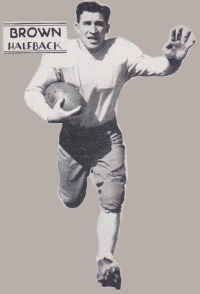 HB Elmer Brown (The Great)1932: UCLA 12, Oregon 7 – Despite being outplayed the entire game, Prink Callison’s Webfoots seemingly had this one in the bag, leading 7-6 with two minutes left, and driving deep into Bruin territory. But the only pass Oregon threw all day went from reserve back Elmer Brown straight to UCLA’s Mike Frankovitch. Oops! Still, the Bruins were backed up to their own seven yard line. Fifteen seconds remained. Then, a dime-store novel finish, in the words of the Oregonian’s L.H. Gregory:
HB Elmer Brown (The Great)1932: UCLA 12, Oregon 7 – Despite being outplayed the entire game, Prink Callison’s Webfoots seemingly had this one in the bag, leading 7-6 with two minutes left, and driving deep into Bruin territory. But the only pass Oregon threw all day went from reserve back Elmer Brown straight to UCLA’s Mike Frankovitch. Oops! Still, the Bruins were backed up to their own seven yard line. Fifteen seconds remained. Then, a dime-store novel finish, in the words of the Oregonian’s L.H. Gregory:
(Yes, that was our own Bill Bowerman, failing to wrap up on the tackle.)Frankovitch, the strong-armed quarterback of the UCLA clan, faded back across his own goal line. Down the east sideline darted Ransom Livesay, the number 14 on his once-yellow jersey all but obliterated by mud. Frankovitch heaved the ball. It soared toward the running Livesay as Bowerman from the defensive right halfback position and Elmer Brown, the Oregon safety, also converged on the falling leather. Livesay turned at the 25 yard line just as Brown, leaping to bat down the pass, missed it entirely. That put him out of the play. Livesay reached out, clutching and then hugging the slippery ball to his side, just as Bowerman dived at him for the tackle. Bowerman had his arms around Livesay, but with a lunge, the UCLA back had spun loose and then, splashing down the sideline far ahead of all possible pursuit, sloshed 75 yards through the mud to the winning touchdown.
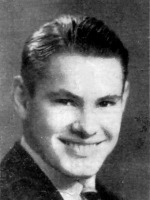 HB/DB Jay Graybeal1938: Oregon 14, UCLA 12 – In a Hayward Field game that Register-Guard sports editor Dick Strite, in typically reserved fashion, called “the most spectacular game seen behind the drab wooden walls of the University stadium as long as memory recalls”, the Webfoots traded touchdowns with the Bruins, but made their extra points while UCLA missed theirs. A fourth quarter touchdown pass from Jay Graybeal to Ted Gebhardt won the game for Oregon. The game wasn’t decided until Graybeal, the “Pendleton Jackrabbit,” intercepted the final pass from UCLA’s QB Chuck Fennenbock in the end zone as time expired. The home team, using the “Oliver’s Twist” 6-2-2-1 box defense of new HC Tex Oliver, held UCLA’s great Kenny Washington to 33 yards on 13 carries. There was brief Rose Bowl enthusiasm, as the game put Oregon at 2-0 in conference play, but as with the rest of Oliver’s Webfoot squads, the 1938 team finished below .500.
HB/DB Jay Graybeal1938: Oregon 14, UCLA 12 – In a Hayward Field game that Register-Guard sports editor Dick Strite, in typically reserved fashion, called “the most spectacular game seen behind the drab wooden walls of the University stadium as long as memory recalls”, the Webfoots traded touchdowns with the Bruins, but made their extra points while UCLA missed theirs. A fourth quarter touchdown pass from Jay Graybeal to Ted Gebhardt won the game for Oregon. The game wasn’t decided until Graybeal, the “Pendleton Jackrabbit,” intercepted the final pass from UCLA’s QB Chuck Fennenbock in the end zone as time expired. The home team, using the “Oliver’s Twist” 6-2-2-1 box defense of new HC Tex Oliver, held UCLA’s great Kenny Washington to 33 yards on 13 carries. There was brief Rose Bowl enthusiasm, as the game put Oregon at 2-0 in conference play, but as with the rest of Oliver’s Webfoot squads, the 1938 team finished below .500. 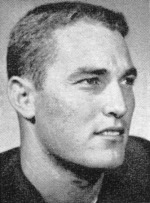 Charley Tourville1958: UCLA 7, Oregon 3 – It was to be Oregon’s last game played in Los Angeles until, well, as far as anyone knew, forever; the Pacific Coast Conference was dissolving at season’s end, and the new “Big Five” conference that replaced it had no room for the Ducks. And on this November day, it appeared the goal was to give the fans nothing to remember either team by.
Charley Tourville1958: UCLA 7, Oregon 3 – It was to be Oregon’s last game played in Los Angeles until, well, as far as anyone knew, forever; the Pacific Coast Conference was dissolving at season’s end, and the new “Big Five” conference that replaced it had no room for the Ducks. And on this November day, it appeared the goal was to give the fans nothing to remember either team by.
The Ducks had all season deployed a tenacious D (allowing just six points per game, with three shutouts in seven contests) but an offensive O (three shutouts and just ten points per game). Both traits were in demonstration against the Bruins: After 55 minutes of play, the score at the LA Coliseum was 0-0, in what Al Wolf of the LA Times called “a dreary mish-mash of futility, frustration and foolishness.” Then, all hell broke loose. Oregon kicker John Clarke hit a 17 yard field goal to give the Ducks a lead. A short kickoff gave the Bruins great field position, at their 45; and two long passes from UCLA QB Kirk Wilson to end Phil Parslow put UCLA in position for a nine yard dive by fullback Ray Smith for the touchdown. Three minutes remained, sufficient time for a final drive, but Oregon’s Charley Tourville fumbled the ensuing kickoff return, which was recovered by Jim Steffen of the Bruins – his third takeaway of the game – and UCLA ran out the clock.
It was Oregon’s fourth loss by seven or fewer points in 1958; they would lose one more like that, in what must have seemed a microcosm of the season, 2-0 at Miami.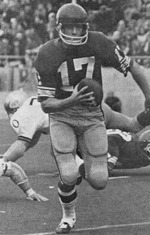 QB/P Tom Blanchard1970: Oregon 41, UCLA 40 – The talented but paper-thin Ducks, who at 2-2 had one of the nation’s top passing attacks but were otherwise performing to expectations, met a team of Bruins in the LA Coliseum that expected to contend for a Rose Bowl berth after missing out by two points in 1969. Although they held a 21-18 halftime lead, the leaky defense of the Ducks resulted in a three TD second-half onslaught by UCLA’s quarterback Dennis Dummit. With 4:12 left in the game, the form chart was holding, UCLA leading 40-21, and most of the fans had begun making their way to the exits.
QB/P Tom Blanchard1970: Oregon 41, UCLA 40 – The talented but paper-thin Ducks, who at 2-2 had one of the nation’s top passing attacks but were otherwise performing to expectations, met a team of Bruins in the LA Coliseum that expected to contend for a Rose Bowl berth after missing out by two points in 1969. Although they held a 21-18 halftime lead, the leaky defense of the Ducks resulted in a three TD second-half onslaught by UCLA’s quarterback Dennis Dummit. With 4:12 left in the game, the form chart was holding, UCLA leading 40-21, and most of the fans had begun making their way to the exits.
Rolling the dice, Oregon HC Jerry Frei replaced his brilliant but erratic sophomore QB, Dan Fouts, with the veteran but oft-injured punter and reserve QB Tom Blanchard. And things began to click. Blanchard, who hadn’t taken a snap at QB in three games, moved the team downfield in three plays and 33 seconds, hitting Bobby Moore for the TD; 40-28. UCLA coach Tommy Prothro, with under four minutes remaining, figured the game was still in hand. He swapped little-used reserve QB Jim Nader for Dummit. Nader fumbled three plays later, the Ducks recovered on the UCLA 40; two plays after that, Blanchard tossed a bomb to Moore for another score. 40-35. 2:24 left, Ken Woody’s onside kick was recovered by Don Frease for Oregon.
On third down Blanchard threw a fade to Leland Glass that appeared to be caught by UCLA DB Jerry Jaso at the 11, but officials said Glass and Jaso had attained simultaneous possession; first down at the 10. But Blanchard had played the previous series with a separated shoulder – earned while blocking for Moore on a sweep — and had to come out. Fouts returned, but after a Moore run Fouts was sacked on a roll-out for a ten yard loss. 3rd and 14 with a minute left. Finally, TE Greg Specht flashed open over the middle, Fouts hit him on the numbers, and the Ducks led by a point. After a failed two-point attempt, the Bruins got as far as midfield before the re-inserted Dummit’s final pass was picked off by safety Bill Brauner. Ball game, and in the locker room Frei was wiping away tears of joy. “That was the greatest comeback I’ve ever been around,” he said. “Tonight’s game has to top anything that has ever happened to me.”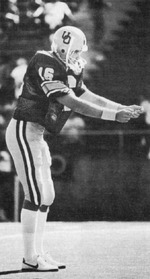 P Mike Preacher1984: Oregon 20, UCLA 18 – The 6-2 Bruins, in Rose Bowl contention as usual, seemed to have everything going for them after staging a furious fourth quarter comeback at Autzen. Trailing 17-3, UCLA QB Steve Bono had thrown two touchdown passes, and the Ducks could only counter with a Matt McLeod field goal. Oregon was on a four-game losing streak and had seen star wideout Lew Barnes limp off the field with a knee injury. And the Bruins had one of the country’s best kickers in John Lee, who seemingly never missed. Here we go again was the likely collective thought of the fans in attendance. After a two point conversion, UCLA was within two with 3:21 left. Oregon couldn’t run out the clock, but punter Mike Preacher hit one of the best kicks of his career, a 48 yard howitzer that bit like it was hit with a sand wedge, downed at the UCLA 13. The Bruins had less than a minute left and no timeouts, and – after tailback Gaston Green was held inches short of the marker on fourth down – no chances left. Oregon wound up 6-5 for the year, the first winning season since 1980; UCLA was 9-3 – the Oregon loss cost them the Rose Bowl, but they beat Miami in the Fiesta Bowl.
P Mike Preacher1984: Oregon 20, UCLA 18 – The 6-2 Bruins, in Rose Bowl contention as usual, seemed to have everything going for them after staging a furious fourth quarter comeback at Autzen. Trailing 17-3, UCLA QB Steve Bono had thrown two touchdown passes, and the Ducks could only counter with a Matt McLeod field goal. Oregon was on a four-game losing streak and had seen star wideout Lew Barnes limp off the field with a knee injury. And the Bruins had one of the country’s best kickers in John Lee, who seemingly never missed. Here we go again was the likely collective thought of the fans in attendance. After a two point conversion, UCLA was within two with 3:21 left. Oregon couldn’t run out the clock, but punter Mike Preacher hit one of the best kicks of his career, a 48 yard howitzer that bit like it was hit with a sand wedge, downed at the UCLA 13. The Bruins had less than a minute left and no timeouts, and – after tailback Gaston Green was held inches short of the marker on fourth down – no chances left. Oregon wound up 6-5 for the year, the first winning season since 1980; UCLA was 9-3 – the Oregon loss cost them the Rose Bowl, but they beat Miami in the Fiesta Bowl.
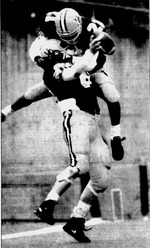 TE Vince Ferry carries RB Sean Burwell after winning catch (AP)1990: Oregon 28, UCLA 24 – Bill Musgrave’s last pass at Autzen Stadium, a 16 yard rifle shot to Vince Ferry with 2:01 remaining, gave Oregon the only lead it saw in the entire game. Oregon OC Mike Bellotti: “He threw his tightest spiral and had his best velocity on the most crucial play of the game… We talked all week about performing at crunch time, and I guess we pretty much did.” The win gave Oregon its first unbeaten home record at Autzen since its opening in 1967. The Ducks had trailed 24-13 with less than ten minutes left, but a Juan Shedrick plunge after a 72 yard drive, along with a two point conversion by Ngalu Kelemeni, put them within three, setting up Musgrave’s heroics. Ferry was a walk-on at tight end, who was only activated because Jeff Thomason had broken his ankle, and the catch was only the fourth of his Oregon career.
TE Vince Ferry carries RB Sean Burwell after winning catch (AP)1990: Oregon 28, UCLA 24 – Bill Musgrave’s last pass at Autzen Stadium, a 16 yard rifle shot to Vince Ferry with 2:01 remaining, gave Oregon the only lead it saw in the entire game. Oregon OC Mike Bellotti: “He threw his tightest spiral and had his best velocity on the most crucial play of the game… We talked all week about performing at crunch time, and I guess we pretty much did.” The win gave Oregon its first unbeaten home record at Autzen since its opening in 1967. The Ducks had trailed 24-13 with less than ten minutes left, but a Juan Shedrick plunge after a 72 yard drive, along with a two point conversion by Ngalu Kelemeni, put them within three, setting up Musgrave’s heroics. Ferry was a walk-on at tight end, who was only activated because Jeff Thomason had broken his ankle, and the catch was only the fourth of his Oregon career.
A crowd estimated at a thousand happy students took 15 minutes dislodging the east goal post from its mooring, passing it up and over the stadium fence and across the Autzen footbridge to the campus; it was eventually dumped on the front porch of the Administration Bvilding.